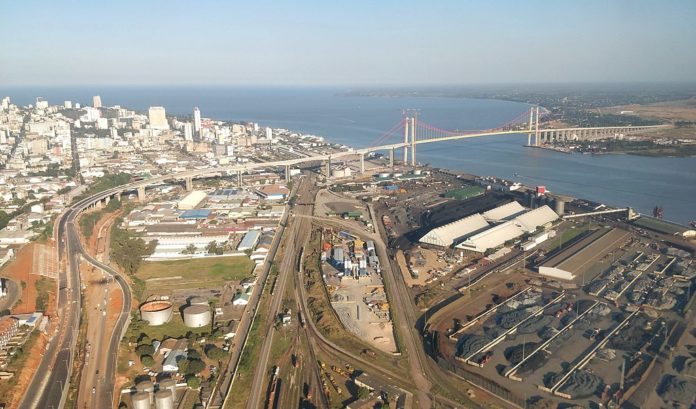Looking out from Mundos to Avenida de Julius Nyerere, you can look to the streets and see the rapid growth that is taking Maputo and the larger Mozambique area from what the British publication theGuardian labeled as a “basket case of Africa” to the young and stable booming economy of the southeast. Gas, coal, gold, Petrobras, Vale, Anadarko—you do not have travel to Tete or Pemba to feel the stampede to Africa similar to the 1949 gold rush in the U.S.

Yours truly was relegated to Hoyo Hoyo Residencial with almost every other place in the Polana area of Maputo fully booked. Still, as corporate companies come with loads of engineers and other technical advisors and workers, Mozambique is relatively untouched from the private equity side. For me, who loves Mozambique like a “fat kid love cake” (sad but true American humor), this question constantly keeps me awake. While I have strategy for how I would enter the space (more talk than action—or is it?), I can definitely highlight one missing thing from this Mozambican “cardapio” (menu), sadly only slightly present as an “entrada” ( appetizer): entrepreneurship.
Entrepreneurship is definitely a needed appetizer to move an economy from what the McKinsey Global Institute currently labels Mozambique, a “transition” economy, to a “diversified” economy. Private equity investors are looking for an entrepreneurial spirit, good management, missing link in a value chain, and scalability amongst several other things. Missing links in the value chain and scalability are easy to find in a country like Mozambique—stories of vegetables being helicoptered into Pemba for workers or expats receiving USD 4000 for housing per month spread like mosquitos during a humid and warm October night in Maputo (hard to avoid random tangents here). Good management is eaten up by the big energy companies—this is not direct criticism of Mozambique but rather a discussion of the challenge of all countries that come upon a big natural resource windfall. A Ghanaian Member of Parliament once told me earlier this year that often politicians get excited about the discovery of something like oil only to later realize that extracting such natural resources always naturally eats into other parts of the economy. In translation, naturally good managers and potential entrepreneurs take high paying opportunities with the new arrivals who are willing to pay more than top salary to pull the “golden” mineral of choice out of the ground. Consequently, new companies and new business arise at a staggeringly slow rate. The availability of cheap imports from neighboring African countries (i.e., South Africa in this case) or from big foreign partners (i.e., France in the case of some West African countries) does not help the situation.
Put all the critiques and criticisms aside of Mozambique and countries currently in the same boat or soon to join (i.e., the DRC, Angola, Tanzania). Also, avoid the political comparisons and debate. Mozambique is not the DRC, Angola or Tanzania, or China, or the U.S. or whatever country from a political standpoint. Nor is the DRC similar to the aforementioned countries and so on. Focus on the ground situation. An entrepreneurial spirit can be cultivated here. I hear stories of it coming along in DRC—I will go to confirm such over the next several months. It is slowly emerging in countries such as Zambia and Senegal and burgeoning in countries such as Kenya and Ghana.
Is education an issue? Partly. A management institute to teach the necessary principles behind business management, IFRS accounting standards, investment banking level financial modeling and advisory could boost entrepreneurship and exponentially grow the availability of good managers in Mozambique and many other countries in the “transition” and even “pre-transition” economy categories. These economies, including Mozambique, have many talented and educated locals who are ready to take their respective countries to the next level and who are hungry for a few extra tips on how to achieve their country’s imagined growth and cash in.
Is access to finance an issue? Yes, but welcome to the continent. I will not say which continent but because I hear borrowing in Europe is not that easy either. All jokes aside, lending has been an issue across Africa for a while and always a challenge in boosting new businesses in a country. It is part of the reason that private equity investors exist along with the potential of creating value.
Is language a barrier? Portuguese is my favorite language (probably more of the Brasilian flavor as Mozambicans tend to tell me that my “sotaque” (accent) sounds different and definitely not of the King’s sort similar to the Brit hearing an American talk on the street). Clearly, I am the American in that situation too (I was never a fan of the monarchy). The French language did not stop the spread of knowledge and ideas. And we know China was not stopped by the use of Mandarin as a national language. Investors, corporates, and everyone else who loves business will learn the local language of the country that intrigues them.
At the end of the day, Mozambique is a country on the verge. It is exciting and lively. The accents like the food like the people have a special flavor that is bound to spread via its success. The challenges are obvious but definitely not too hard to be conquered. Mozambique is a shining light in the southeast and a country that has accomplished so much change in little time. But Mozambique, like many African countries, is not for the timid and coy. Rather, land in Maputo and say “Bom dia, tudo bem?” and, similar to what happens in most of Africa, the conversation just flows from there. I am sure you will find a couple entrepreneurial Mozambicans who just got off the same flight who be willing to show you around and show you where the opportunities lie.

